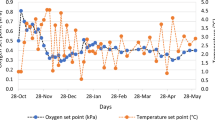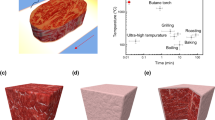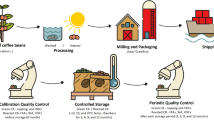Abstract
WHEN dehydrated vegetables are stored at high temperatures (for example, in the tropics) they eventually become unacceptable, usually because of the development of brown pigments. Since many different factors, not precisely controllable, affect the rate at which the brown discoloration develops, it is virtually impossible to predict the storage life of the dehydrated product. Examination of the behaviour of dehydrated vegetables held at 37° C. has been the usual way of studying the effects of variables on ‘tropical’ storage life; but such tests may be prolonged and delay research, while they are of little value to a manufacturer or purchaser who may need information before dispatching or purchasing the material.
This is a preview of subscription content, access via your institution
Access options
Subscribe to this journal
Receive 51 print issues and online access
$199.00 per year
only $3.90 per issue
Buy this article
- Purchase on Springer Link
- Instant access to full article PDF
Prices may be subject to local taxes which are calculated during checkout
Similar content being viewed by others
References
Legault, R. R., et al., Food Tech., 5, 10, 417 (1951). Tomkins, R. G., Recent Work Concerning Dried Vegetables. Unpublished Report of D.S.I.R. Low Temperature Research Station, Cambridge, dated Jan. 5, 1945.
Author information
Authors and Affiliations
Rights and permissions
About this article
Cite this article
GOODING, E., DUCKWORTH, R. Accelerated Storage Tests for Dehydrated Vegetables. Nature 177, 897–898 (1956). https://doi.org/10.1038/177897a0
Issue Date:
DOI: https://doi.org/10.1038/177897a0
Comments
By submitting a comment you agree to abide by our Terms and Community Guidelines. If you find something abusive or that does not comply with our terms or guidelines please flag it as inappropriate.



